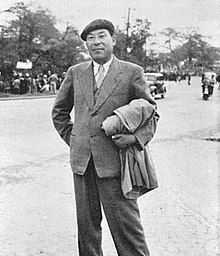Tatsuzō Ishikawa
Tatsuzō Ishikawa | |
|---|---|
 | |
| Born | July 2, 1905 Yokote,Akita Prefecture,Japan |
| Died | January 31, 1985(aged 79) Tokyo,Japan |
| Nationality | Japanese |
| Notable works | Sōbō |
| Notable awards | 1stAkutagawa PrizeforSōbō |
Tatsuzō Ishikawa(Thạch xuyên đạt tam,Ishikawa Tatsuzō,July 2, 1905 – January 31, 1985)was aJapanesewriter. He was the first winner of theAkutagawa Prize.
Biography[edit]
Born inYokote,Akita Prefecture,Japan, Ishikawa was raised in several places, includingKyotoandOkayama Prefecture.He enteredWaseda University's literature department but left before graduating. In 1930 he left Japan forBraziland worked on a farm. Ishikawa won the firstAkutagawa Prizein 1935 forSōbō( thương manh ), a novel based on his experiences in Brazil.
In December 1937, Ishikawa was dispatched toNanjingas a special reporter by theChūō Kōronpublishing company. After landing inShanghai,he arrived inNanjingin January 1938, weeks after the fall of the city to theImperial Japanese Army.Embedded within an army unit later connected to theNanking Massacre,Ishikawa wrote a fictional account (Ikite iru HeitaiSinh きている binh đội ) of the atrocities suffered by Chinese civilians as well as the widespread pessimism of the Japanese soldiers. Due to its controversial subject matter, nearly one-fourth of its contents was censored even before it was scheduled to be serialized inChūō Kōron.Still, the magazine was removed from circulation the day it was published and Ishikawa, the editor, and three publishers were arrested under the 23rd article of the "Newspaper Law" (Shinbunshi HōBáo chí pháp ) for "causing disturbance to peace and order". Ishikawa was sentenced to four months imprisonment and placed on probation for three years.Ikite iru Heitaiwas not to be published in its entirety until after the war, in December 1945. For a complete English translation, seeSoldiers Alive(Trans. Zeljko Cipris, Honolulu: University of Hawai'i Press, 2003).
In 1946, he unsuccessfully ran for a seat in thelower houseof theDiet of Japanin the1946 Japanese general election.Ishikawa continued to be an active writer after the war, and in 1969, he won theKikuchi Kan Prize(Kikuchi Kan ShōCúc trì khoan thưởng ) for his contributions to Japanese literature. He was an active member of theJapan Art Academy.He died in Tokyo in 1985.
Bibliography[edit]
- Sōbō( thương manh ) (1935)
- Ikite iru Heitai( sinh きている binh đội, Soldiers Alive) –1945/ English translation:2003
- Kinkanshoku( kim hoàn thực ) (1966)
Awards[edit]
- 1935 –Akutagawa PrizeforSōbō( thương manh )[1]
- 1969–Kikuchi Kan Prize
References[edit]
- ^Giới xuyên thưởng được thưởng giả một lãm(in Japanese).Bungeishunjū.Retrieved2010-01-27.
